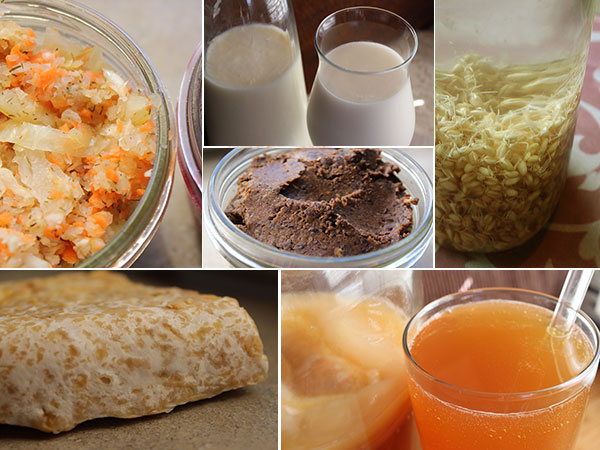Fermented foods are those nutrients rich food stuffs that is obtained by microbial metabolic reactions; simply called as “fermentation” reaction. Dahi (curd), vinegar, soy sauce, pickles, yoghurt, buns, beer and probiotic such as Yakult, are the frequently used and familiar fermented foods. According to Sandor Katz, author of The Art of Fermentation:
Fermented foods are “the flavourful space between fresh and rotten”.
The process of fermenting foods is not new one, evidence indicates that early civilizations were making wine and beer between 7,000 and 8,000 years ago, and bread even before that. India is traditionally rich in fermented foods. In the Indian sub-continent, fermented food using local food crops and other biological resources are very common. Fermented foods such as idli and dahi were described as early as 700 BC. At present, there are hundreds of fermented foods with different base materials and preparation methodology. Each fermented food is associated with a unique group of microbiota, which increases the level of proteins, vitamins, essential amino acids and fatty acids.
Benefits: Foods like idlis, dosas, dhoklas, wadas and kadhi are some of the lactobacillus fermented cereals and legumes that are commonly consumed in India. The fermented foods increase the absorption of vital minerals from gastrointestinal tract, thus preventing mineral deficiencies. Bread, fish sauce, wine and beer are some of the yeast-based fermented food beverages.
Experts say that probiotic foods improve immunity, aids in better digestion, absorption of calcium and prevention of allergies. They also help in treating diarrhoea. If a pregnant woman consumes probiotic food like a month before her delivery, this will help prevent the new born infant from contracting allergies to some extent. Also, if infants who are six months and older are given probiotic food it helps to build their immunity.
Indian fermented foods are consumed by the local population not just as a diet but as traditional medicine too. Many of the foods were observed to have beneficial effect during ailment by the local people and they are used as a special diet or medicine for ages. Fermented food idli is easily digested and often used as food for infant and invalids. Fermented milk dahi can be used to cure intestinal disease such as diarrhea; intake of dahi has anti-cholesteremic, anticarcinogenic, anti-diabetic, angiotensin-converting enzyme inhibition effect and anti-atopic dermatitis effect. The above properties are validated by in vivo experiments. Certain fermented vegetable products such as sinki and common pickles are said to be good appetizers, and the ethnic people use these foods for remedies from indigestion. Bhutia women use gundruk soup and give it to breast-feeding mothers to improve milk efficiency. It is considered as a tonic for old age people. Fermented radish root pieces are called sinki. It is very effective in curing diarrhea and stomach pain, and is consumed mostly during lean period. Fermented rai helps in curing stomach pain and gas trouble, and significantly improves digestion. Kanjika or kanji is a lactic fermented rice product. It has been prescribed for a number of chronic diseases by Indian Ayurvedic practitioners. Carrot Kanji is considered to have high nutritional value and cooling and soothing properties. Beetroot kanji is considered to have potential to prevent infection and malignant disease. Fermented BS juice has preservation property similar to vinegar. The Meitei community in Northeastern India use fermented BSs (Soibum) along with fermented fish against the plague disease. Ngari-dry fish of Puntus breed Phutunis or Eromus dandricus is mixed with Iromba (fermented BSs) and this dish called Yongchak Iromba is considered as an appetizer and is well known to the old age women of the Meitei community. Most of the claims are based on traditional beliefs; hence there is a scope to conduct experiment-based research to prove these claims.
Examples of some Indian fermented foods.
|
Fermented food |
Ingredients |
Place of origin |
Related Microorganisms |
|
Rabdi (rabadi)
|
Flour of barley, pearl millet, corn or soybean and country buttermilk
|
Rajasthan |
Bacillus and Micrococcus sp. |
|
Kulu |
Wheat flour, buttermilk |
Himachal Pradesh |
Lactobacillus sp. |
|
Idli
|
Rice, black gram dhal, table salt, fenugreek seeds |
South India |
L. mesenteroides, E. faecalis, P. cerevisiae |
|
Dosa |
Rice, black gram dhal (either raw or parboiled rice), table salt |
South India |
L. mesenteroides, E. faecalis |
|
Dhokla |
Bengal gram dhal, rice and leafy vegetables |
Gujrat |
L. fermentum, L. mesenteroides, E. faecalis |
|
Chilra or lwar |
Wheat/barley, buckwheat flour and starter material Treh |
North India |
Not reported |
|
Sinki |
Radish root |
North-east India |
L. casei, L. brevis, L. plantarum, L. fallax, L. fermentum |
|
Kinema |
Soybeans |
Darjeeling, Sikkim |
E. faecium |
|
Kanji |
Carrot or beet root, rice, mustard |
North India |
L. pentosus, L. paraplantarum, L. plantarum |
|
Curd (Dahi) |
Milk |
India |
S. cremoris, S. lactis, S.thermophilus, L. bulgaricus, L. acidophilus, L. helveticus, L. cremoris, , Lactobacillus delbrueckii subsp. indicus |
|
Gundruk |
Leaves of mustard/ radish/cauliflower |
Arunachal Pradesh |
P. pentasaceous, L. fermentum, L. casei
|
Food Poisoning: Except above merits, fermented foods are more prone to be contaminated. Over growth of unwanted secondary microbial species may alter the fermented food properties by releasing several harmful metabolites and lead to the intoxication or poisoning. Numerous food-borne outbreaks have been reported throughout the India. Due to the contamination, a popular nutritive Indonesian fermented food “Tempeh” has been periodically caused food poisoning and death in Central Java. Microbes such as Clostridium, Brucella, Escherichia, Salmonella and Bacillus species are generally associated with food borne illness. Therefore, special caution should be taken before consuming the fermented food products.
